In this comprehensive guide, we'll explore 75 diverse ways to greet the morning in French, ranging from formal salutations to casual expressions and even some regional variations.
Whether you're preparing for an early business meeting with French colleagues, meeting a friend for a croissant and café au lait, or simply want to impress your French-speaking neighbors, we've got you covered.
From the classic "Bonjour" to more elaborate phrases like "Quelle belle journée!", you'll discover expressions for every morning situation imaginable.
How do you say good morning in French in 75 ways?
French morning greetings can vary greatly depending on the formality of the situation, the time of day, and your relationship with the person you're greeting. Let's explore the myriad ways to start your day in French.
Formal ways to say good morning in French
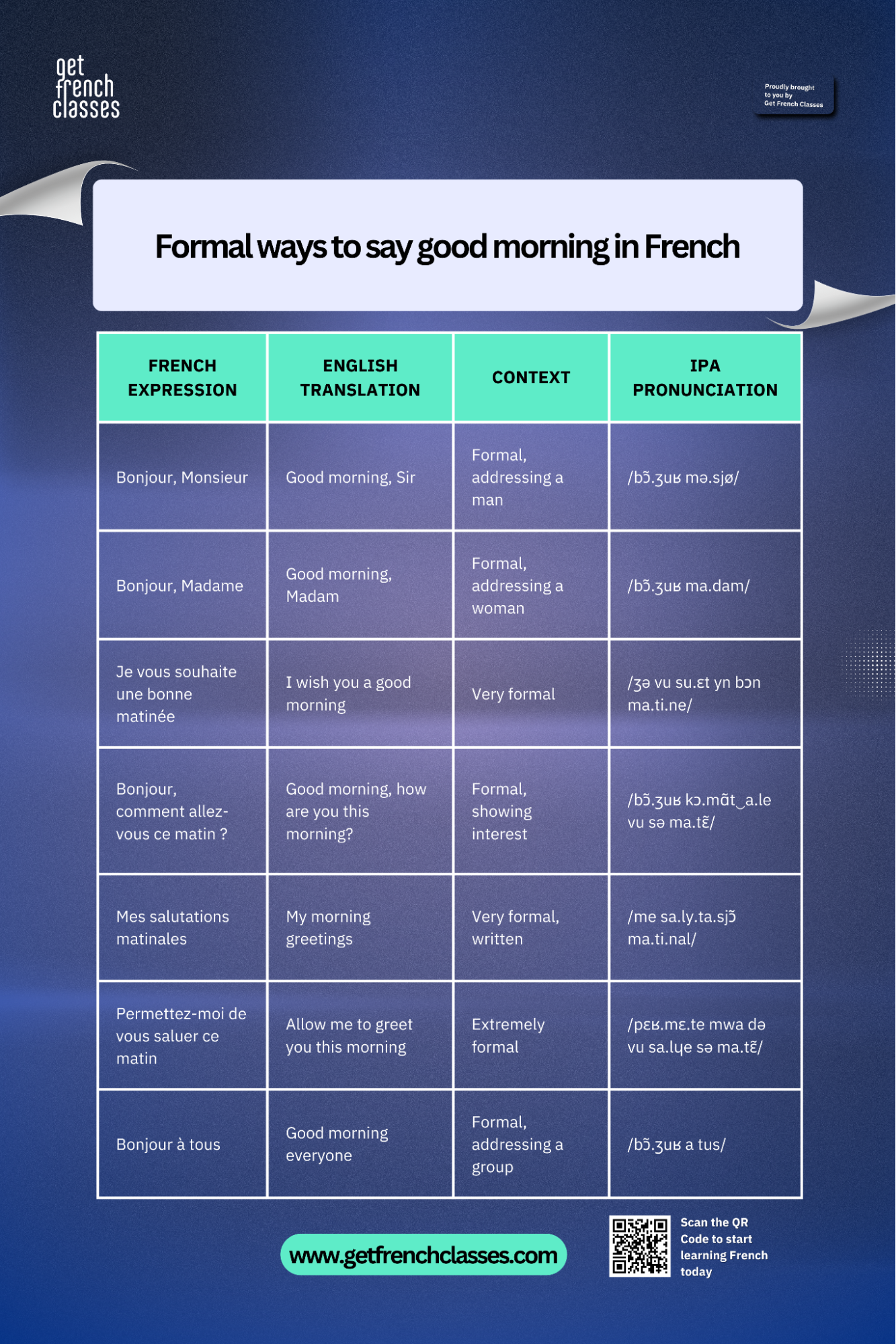
In formal situations, such as business meetings, official events, or when addressing people you don't know well, it's important to use more polite and elaborate french morning greetings.
| French Expression | English Translation | Context | IPA Pronunciation |
|---|---|---|---|
| Bonjour, Monsieur | Good morning, Sir | Formal, addressing a man | /bɔ̃.ʒuʁ mə.sjø/ |
| Bonjour, Madame | Good morning, Madam | Formal, addressing a woman | /bɔ̃.ʒuʁ ma.dam/ |
| Je vous souhaite une bonne matinée | I wish you a good morning | Very formal | /ʒə vu su.ɛt yn bɔn ma.ti.ne/ |
| Bonjour, comment allez-vous ce matin ? | Good morning, how are you this morning? | Formal, showing interest | /bɔ̃.ʒuʁ kɔ.mɑ̃t‿a.le vu sə ma.tɛ̃/ |
| Mes salutations matinales | My morning greetings | Very formal, written | /me sa.ly.ta.sjɔ̃ ma.ti.nal/ |
| Permettez-moi de vous saluer ce matin | Allow me to greet you this morning | Extremely formal | /pɛʁ.mɛ.te mwa də vu sa.lɥe sə ma.tɛ̃/ |
| Bonjour à tous | Good morning everyone | Formal, addressing a group | /bɔ̃.ʒuʁ a tus/ |
Examples and explanations:
-
In a business meeting: Bonjour, Madame. J'espère que vous avez passé une bonne nuit. Good morning, Madam. I hope you had a good night. This combination of a formal greeting with a polite inquiry about the person's night is common in professional settings.
-
Starting a formal presentation: Bonjour à tous. Je vous souhaite une excellente matinée. Good morning everyone. I wish you an excellent morning. This greeting addresses the entire group formally and sets a positive tone for the presentation.
-
Greeting a superior at work: Bonjour, Monsieur. Comment allez-vous ce matin ? Good morning, Sir. How are you this morning? This shows respect and interest in the person's well-being, appropriate for addressing a superior.
Casual and everyday good morning expressions in French
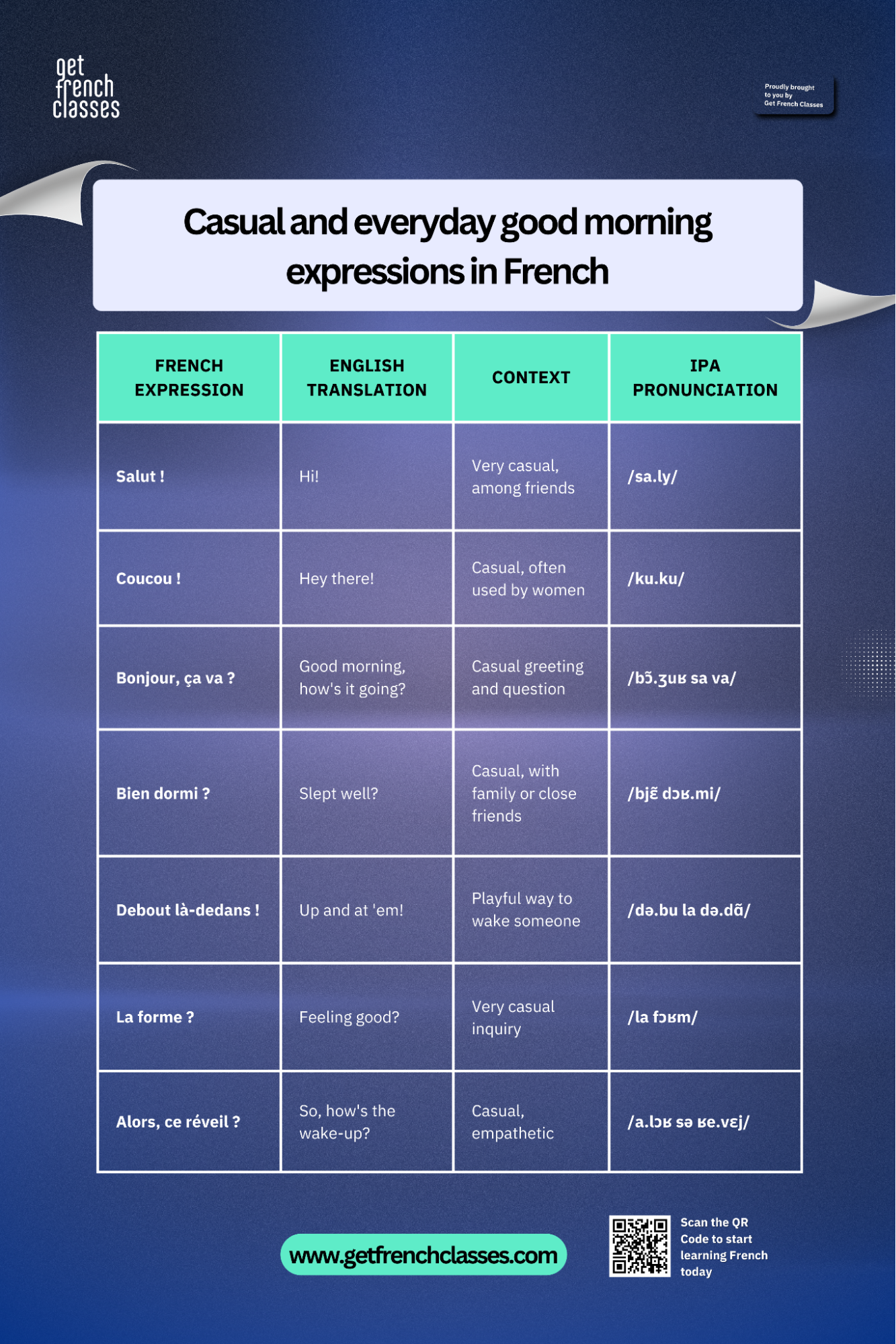
For everyday situations with friends, family, or in informal settings, you can use more relaxed expressions to greet people in the morning.
| French Expression | English Translation | Context | IPA Pronunciation |
|---|---|---|---|
| Salut ! | Hi! | Very casual, among friends | /sa.ly/ |
| Coucou ! | Hey there! | Casual, often used by women | /ku.ku/ |
| Bonjour, ça va ? | Good morning, how's it going? | Casual greeting and question | /bɔ̃.ʒuʁ sa va/ |
| Bien dormi ? | Slept well? | Casual, with family or close friends | /bjɛ̃ dɔʁ.mi/ |
| Debout là-dedans ! | Up and at 'em! | Playful way to wake someone | /də.bu la də.dɑ̃/ |
| La forme ? | Feeling good? | Very casual inquiry | /la fɔʁm/ |
| Alors, ce réveil ? | So, how's the wake-up? | Casual, empathetic | /a.lɔʁ sə ʁe.vɛj/ |
Examples and explanations:
-
Greeting a roommate: Salut toi! Bien dormi ? " ( Hi! Slept well? This casual combination is perfect for close friends or family members you see first thing in the morning.
-
Waking up your partner: " Coucou, mon amour. La forme ce matin ? " ( Hey there, my love. Feeling good this morning? "Coucou" adds a sweet, affectionate touch to the morning greeting.
-
Meeting a friend for breakfast: Bonjour Mademoiselle, ça va ? Prêt pour un café ? " ( Good morning Miss, how's it going? Ready for a coffee? This greeting combines a casual hello with a question and a suggestion, typical in friendly morning encounters.
Good morning greetings based on time of day
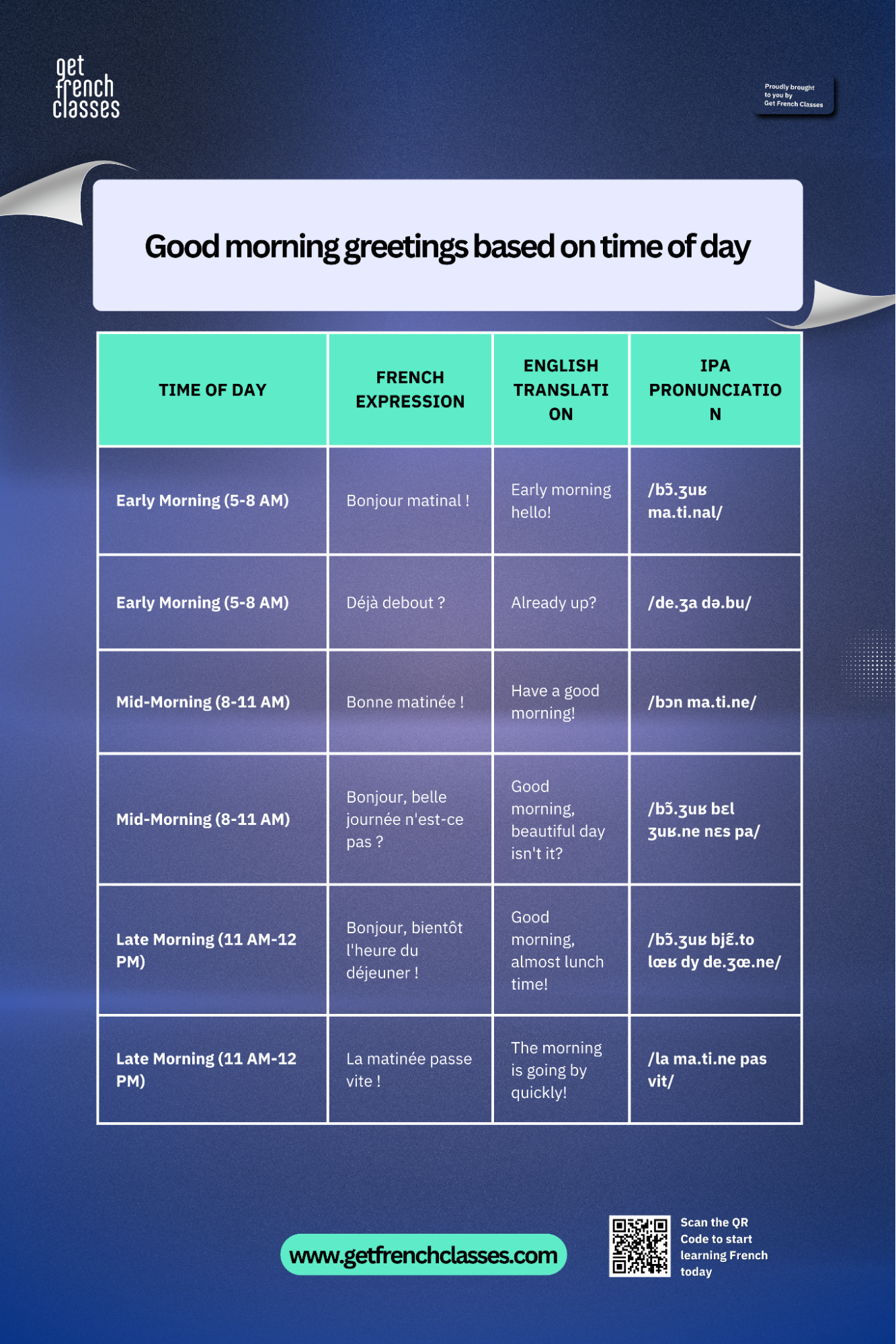
The way you greet someone in French can vary depending on the specific time of morning. Here's how to adjust your greetings throughout the morning hours.
| Time of Day | French Expression | English Translation | IPA Pronunciation |
|---|---|---|---|
| Early Morning (5-8 AM) | Bonjour matinal ! | Early morning hello! | /bɔ̃.ʒuʁ ma.ti.nal/ |
| Early Morning (5-8 AM) | Déjà debout ? | Already up? | /de.ʒa də.bu/ |
| Mid-Morning (8-11 AM) | Bonne matinée ! | Have a good morning! | /bɔn ma.ti.ne/ |
| Mid-Morning (8-11 AM) | Bonjour, belle journée n'est-ce pas ? | Good morning, beautiful day isn't it? | /bɔ̃.ʒuʁ bɛl ʒuʁ.ne nɛs pa/ |
| Late Morning (11 AM-12 PM) | Bonjour, bientôt l'heure du déjeuner ! | Good morning, almost lunch time! | /bɔ̃.ʒuʁ bjɛ̃.to lœʁ dy de.ʒœ.ne/ |
| Late Morning (11 AM-12 PM) | La matinée passe vite ! | The morning is going by quickly! | /la ma.ti.ne pas vit/ |
Examples and context:
-
Early morning at a bakery: Bonjour matinal ! Vous êtes bien courageux d'ouvrir si tôt. " ( Early morning hello! You're quite brave to open so early. This acknowledges the early hour and shows appreciation for the baker's early start.
-
Mid-morning at work: Bonne matinée à tous ! J'espère que votre journée commence bien ." ( Have a good morning everyone! I hope your day is starting well.
This is a cheerful way to greet colleagues as you arrive at the office.
-
Late morning, running into a neighbor: Bonjour, bientôt l'heure du déjeuner ! La matinée passe vite, n'est-ce pas ? " ( Good morning, almost lunch time! The morning is going by quickly, isn't it?
This greeting acknowledges the later part of the morning and can start a casual conversation about plans for lunch or the rest of the day.
Good morning greetings with titles and names
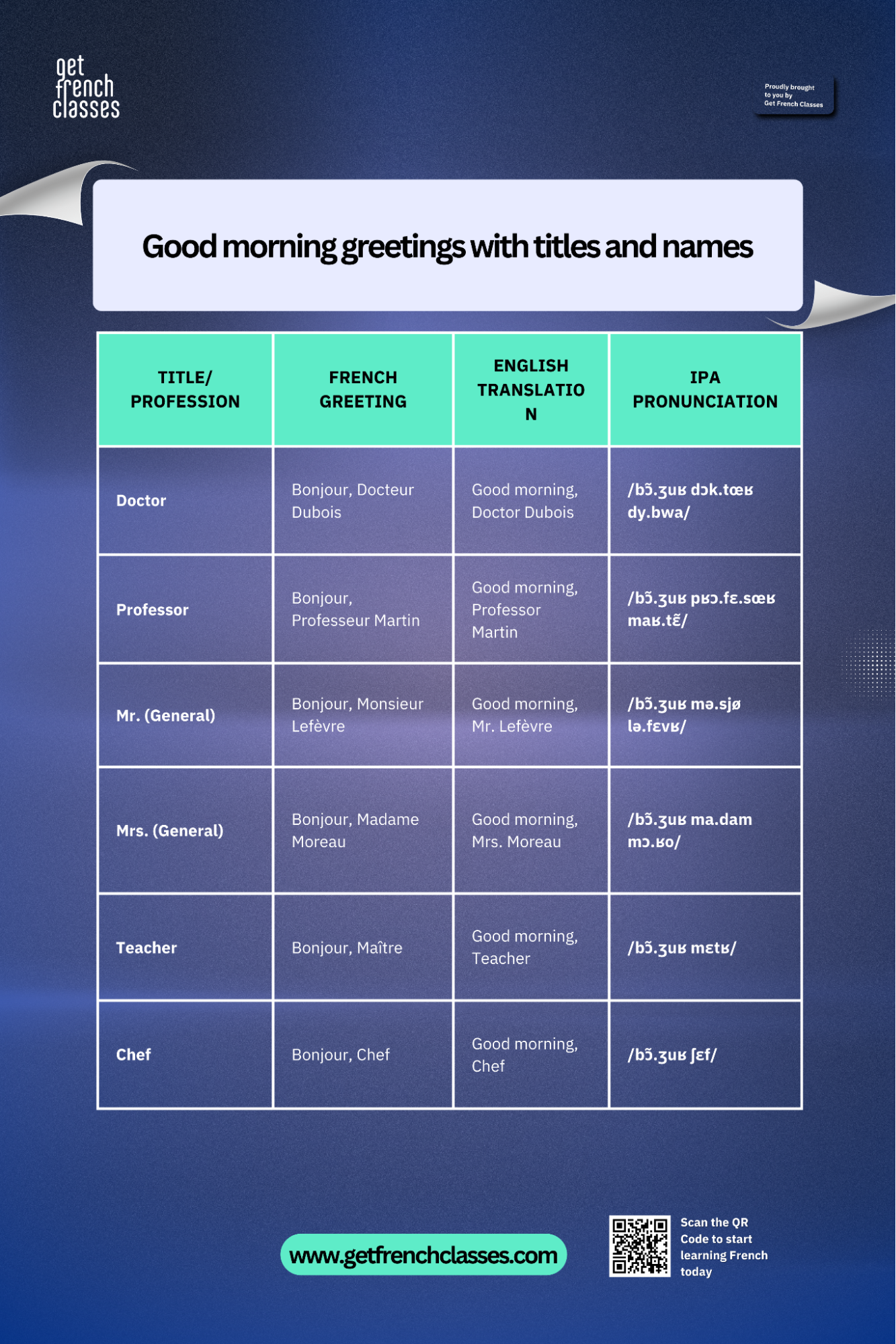
In French, it's common to use titles and sometimes names when greeting people, especially in formal or professional settings. Here's how to incorporate titles and names into your morning greetings:
| Title/Profession | French Greeting | English Translation | IPA Pronunciation |
|---|---|---|---|
| Doctor | Bonjour, Docteur Dubois | Good morning, Doctor Dubois | /bɔ̃.ʒuʁ dɔk.tœʁ dy.bwa/ |
| Professor | Bonjour, Professeur Martin | Good morning, Professor Martin | /bɔ̃.ʒuʁ pʁɔ.fɛ.sœʁ maʁ.tɛ̃/ |
| Mr. (General) | Bonjour, Monsieur Lefèvre | Good morning, Mr. Lefèvre | /bɔ̃.ʒuʁ mə.sjø lə.fɛvʁ/ |
| Mrs. (General) | Bonjour, Madame Moreau | Good morning, Mrs. Moreau | /bɔ̃.ʒuʁ ma.dam mɔ.ʁo/ |
| Teacher | Bonjour, Maître | Good morning, Teacher | /bɔ̃.ʒuʁ mɛtʁ/ |
| Chef | Bonjour, Chef | Good morning, Chef | /bɔ̃.ʒuʁ ʃɛf/ |
Tips for incorporating names:
-
In formal situations, use the title followed by the last name.
-
For close colleagues or in less formal settings, you can use just the first name: "Bonjour, Marie!"
-
When unsure, it's safer to use "Monsieur" or "Madame" without a name.
Example : " Bonjour, Professeur Martin. J'espère que vous avez passé une bonne nuit. " ( Good morning, Professor Martin. I hope you had a good night.
Romantic good morning expressions in French
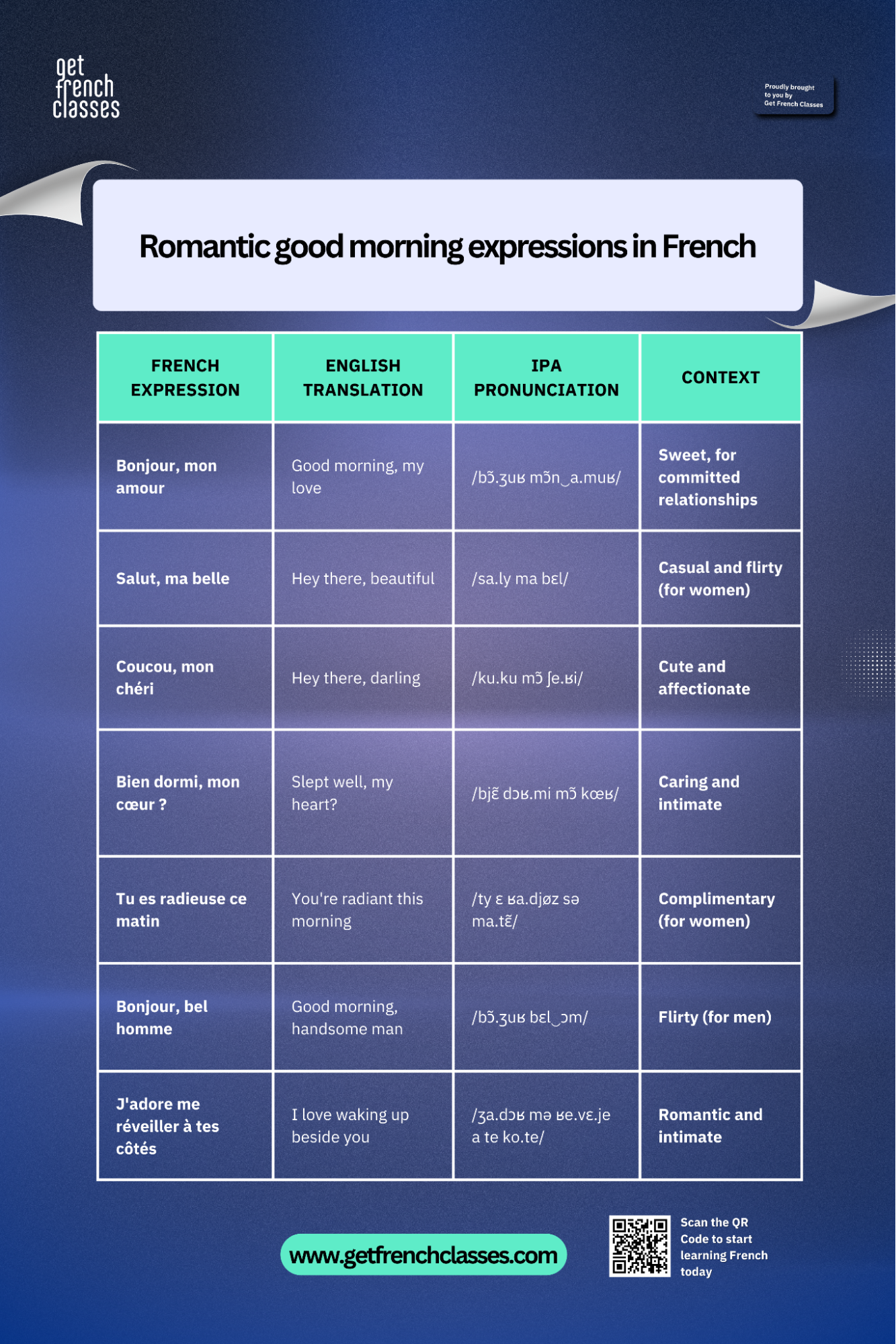
French is often considered the language of love, and morning greetings can be particularly sweet and romantic. That's why you want to take into accounts these cultural norms during your french language learning journey. Here are some expressions to use with your partner:
| French Expression | English Translation | IPA Pronunciation | Context |
|---|---|---|---|
| Bonjour, mon amour | Good morning, my love | /bɔ̃.ʒuʁ mɔ̃n‿a.muʁ/ | Sweet, for committed relationships |
| Salut, ma belle | Hey there, beautiful | /sa.ly ma bɛl/ | Casual and flirty (for women) |
| Coucou, mon chéri | Hey there, darling | /ku.ku mɔ̃ ʃe.ʁi/ | Cute and affectionate |
| Bien dormi, mon cœur ? | Slept well, my heart? | /bjɛ̃ dɔʁ.mi mɔ̃ kœʁ/ | Caring and intimate |
| Tu es radieuse ce matin | You're radiant this morning | /ty ɛ ʁa.djøz sə ma.tɛ̃/ | Complimentary (for women) |
| Bonjour, bel homme | Good morning, handsome man | /bɔ̃.ʒuʁ bɛl‿ɔm/ | Flirty (for men) |
| J'adore me réveiller à tes côtés | I love waking up beside you | /ʒa.dɔʁ mə ʁe.vɛ.je a te ko.te/ | Romantic and intimate |
Example : " Coucou, mon chéri. Ton sourire est la plus belle façon de commencer ma journée. " ( Hey there, darling. Your smile is the most beautiful way to start my day.
Regional differences and ways to say good morning in French-speaking countries
French is spoken in many countries around the world, and each region has developed its own unique morning greeting expressions. Here's a look at some variations from French-speaking countries:
| Region | French Expression | English Translation | IPA Pronunciation |
|---|---|---|---|
| Quebec, Canada | Bon matin | Good morning | /bɔ̃ ma.tɛ̃/ |
| Belgium | Bonjour, une fois | Good morning, once | /bɔ̃.ʒuʁ yn fwa/ |
| Switzerland | Salut, bien ? | Hi, good? | /sa.ly bjɛ̃/ |
| Côte d'Ivoire | On est ensemble | We are together | /ɔ̃n‿ɛt‿ɑ̃.sɑ̃bl/ |
| Senegal | Salamalekum | Peace be upon you (Arabic origin) | /sa.la.ma.le.kum/ |
| Louisiana, USA | Bonjour, comment ça va ? | Good morning, how's it going? | /bɔ̃.ʒuʁ kɔ.mɑ̃ sa va/ |
| Tahiti | Ia orana | Hello/Good morning | /ja o.ʁa.na/ |
Examples and cultural insights:
-
In Quebec: Bon matin! As-tu pris ton café? " ( Good morning! Have you had your coffee? Quebecois French often uses "bon matin" instead of "bonjour," which is more common in France.
-
In Belgium: Bonjour, une fois ! Ça va bien aujourd'hui ? " ( Good morning, once! All good today?
Adding "une fois" (literally "one time") is a typical Belgian way of speaking. It doesn't change the meaning but adds local flavor.
-
In Côte d'Ivoire: On est ensemble ce matin ! Comment va la famille ? " ( We are together this morning! How's the family?
This greeting emphasizes community and connection, which is important in many African cultures.
-
In Senegal: Salamalekum! Comment s'est passée la nuit ? " ( Peace be upon you! How was the night?
This greeting shows the influence of Arabic and Islamic culture in Senegalese French.
Situational good morning greetings
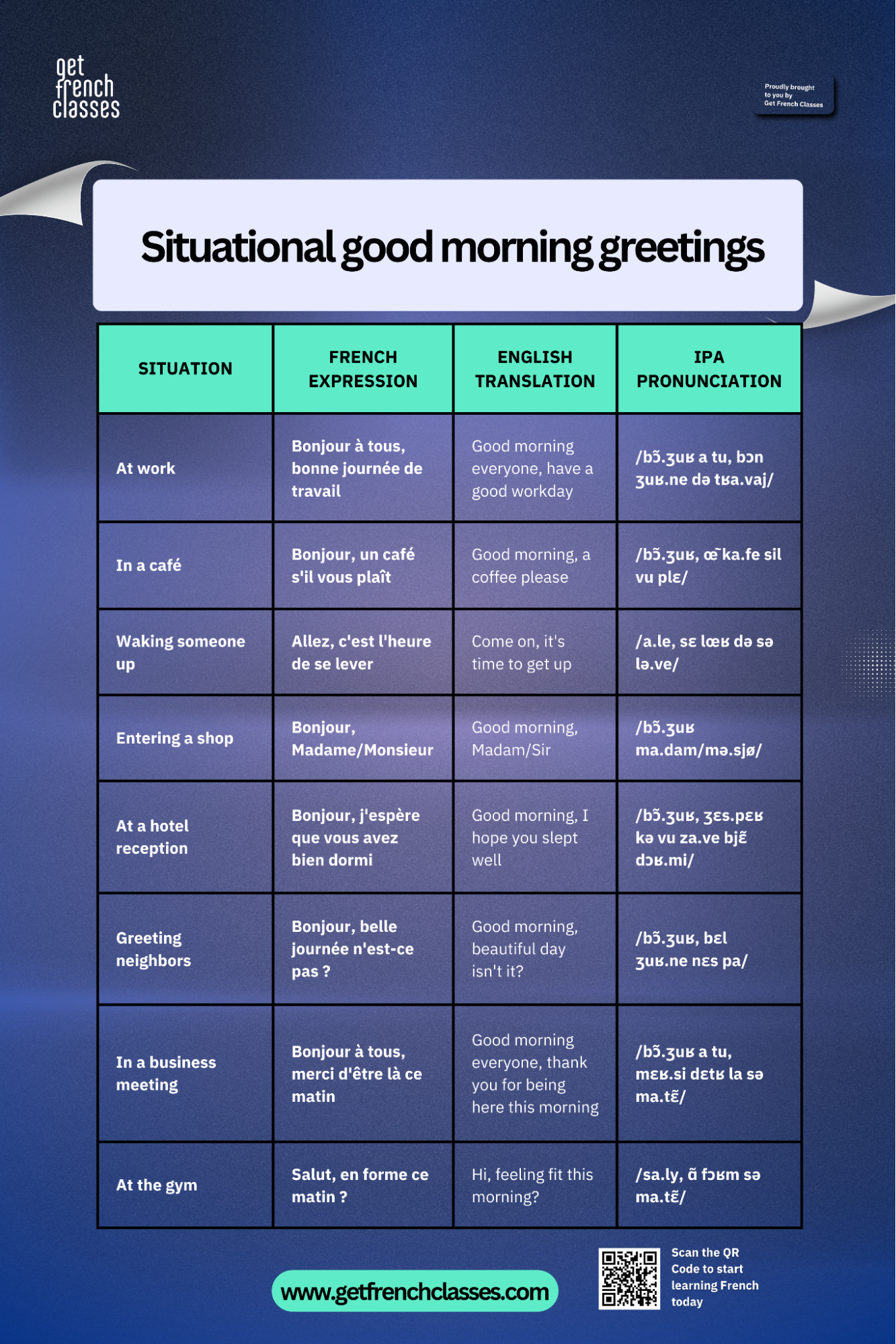
The way you say good morning in French can vary depending on the specific situation you're in. Here are some context-specific morning greetings for various situations you might encounter.
| Situation | French Expression | English Translation | IPA Pronunciation |
|---|---|---|---|
| At work | Bonjour à tous, bonne journée de travail | Good morning everyone, have a good workday | /bɔ̃.ʒuʁ a tu, bɔn ʒuʁ.ne də tʁa.vaj/ |
| In a café | Bonjour, un café s'il vous plaît | Good morning, a coffee please | /bɔ̃.ʒuʁ, œ̃ ka.fe sil vu plɛ/ |
| Waking someone up | Allez, c'est l'heure de se lever | Come on, it's time to get up | /a.le, sɛ lœʁ də sə lə.ve/ |
| Entering a shop | Bonjour, Madame/Monsieur | Good morning, Madam/Sir | /bɔ̃.ʒuʁ ma.dam/mə.sjø/ |
| At a hotel reception | Bonjour, j'espère que vous avez bien dormi | Good morning, I hope you slept well | /bɔ̃.ʒuʁ, ʒɛs.pɛʁ kə vu za.ve bjɛ̃ dɔʁ.mi/ |
| Greeting neighbors | Bonjour, belle journée n'est-ce pas ? | Good morning, beautiful day isn't it? | /bɔ̃.ʒuʁ, bɛl ʒuʁ.ne nɛs pa/ |
| In a business meeting | Bonjour à tous, merci d'être là ce matin | Good morning everyone, thank you for being here this morning | /bɔ̃.ʒuʁ a tu, mɛʁ.si dɛtʁ la sə ma.tɛ̃/ |
| At the gym | Salut, en forme ce matin ? | Hi, feeling fit this morning? | /sa.ly, ɑ̃ fɔʁm sə ma.tɛ̃/ |
Examples and etiquette tips
-
At work: Bonjour à tous, j'espère que vous avez passé un bon weekend. Bonne journée de travail ! " ( Good morning everyone, I hope you had a good weekend. Have a good workday! Etiquette tip : In French workplaces, it's customary to greet everyone when you arrive. If you work in a small office, you might greet each person individually. In larger offices, a general greeting to everyone is acceptable.
-
In a café: Bonjour, un café crème et un croissant, s'il vous plaît. " ( Good morning, a coffee with cream and a croissant, please. Etiquette tip : Always greet the staff before placing your order. It's considered rude in France to start with your order without saying hello first.
-
Waking someone up: Bonjour mon chéri, c'est l'heure de se lever. Tu as bien dormi ? " ( Good morning darling, it's time to get up. Did you sleep well? Etiquette tip : When waking someone, start with a gentle greeting before telling them it's time to get up. This softer approach is considered more polite.
-
Entering a shop: Bonjour, Madame. Il fait beau aujourd'hui, n'est-ce pas ? " ( Good morning, Madam. It's a beautiful day today, isn't it? Etiquette tip : In France, it's very important to greet shop staff when you enter. Not doing so is considered extremely rude. A simple "Bonjour" is sufficient, but you can add a comment about the weather for a friendly touch.
-
At a hotel reception: Bonjour, j'espère que vous avez bien dormi. Votre petit-déjeuner est servi dans la salle à manger. " ( Good morning, I hope you slept well. Your breakfast is served in the dining room. Etiquette tip : If you're the hotel staff, always greet guests with a smile and inquire about their stay. As a guest, always greet the staff before making any requests.
How to respond to good morning in French
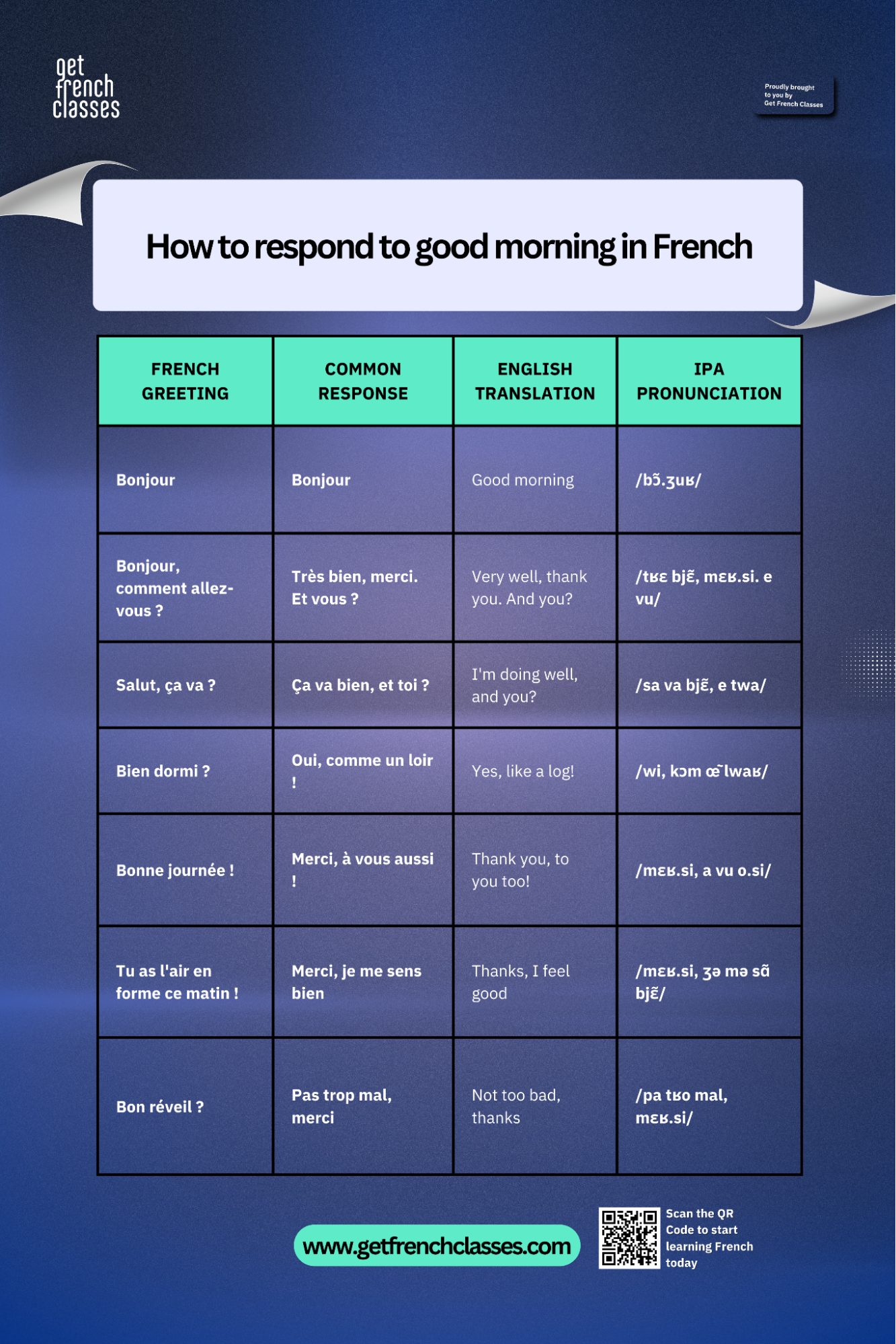
Now, when people ask you, "How do you say 'good morning' in French?" you'll have plenty of ideas to share. But, knowing how to respond when someone greets you in the morning is just as important as knowing how to say good morning. Here are some common responses to various morning greetings in French that you may hear from many French speakers.
| French Greeting | Common Response | English Translation | IPA Pronunciation |
|---|---|---|---|
| Bonjour | Bonjour | Good morning | /bɔ̃.ʒuʁ/ |
| Bonjour, comment allez-vous ? | Très bien, merci. Et vous ? | Very well, thank you. And you? | /tʁɛ bjɛ̃, mɛʁ.si. e vu/ |
| Salut, ça va ? | Ça va bien, et toi ? | I'm doing well, and you? | /sa va bjɛ̃, e twa/ |
| Bien dormi ? | Oui, comme un loir ! | Yes, like a log! | /wi, kɔm œ̃ lwaʁ/ |
| Bonne journée ! | Merci, à vous aussi ! | Thank you, to you too! | /mɛʁ.si, a vu o.si/ |
| Tu as l'air en forme ce matin ! | Merci, je me sens bien | Thanks, I feel good | /mɛʁ.si, ʒə mə sɑ̃ bjɛ̃/ |
Examples and usage tips:
-
Formal setting:
-
Person A : " Bonjour Madame, comment allez-vous ce matin ?
-
Person B : " Bonjour Monsieur, je vais très bien, merci. Et vous-même ?
Usage tip : In formal situations, always mirror the level of politeness used by the person greeting you. Use "vous" and titles like Madame or Monsieur.
-
Among friends:
-
Friend A : "Salut ! Bien dormi ?"
-
Friend B : "Comme un loir ! Et toi, la forme ?"
Usage tip : With friends, you can use more casual expressions and ask about their sleep or general state in return.
-
At work:
-
Colleague A : " Bonjour, tu as l'air en forme ce matin !
-
Colleague B : " Merci, je me sens bien. Bon café ce matin !
Usage tip : It's nice to acknowledge a compliment and perhaps add a small comment about why you're feeling good.
-
Responding to "Bonne journée":
-
Person A : " Bonne journée !
-
Person B : " Merci, à vous aussi !
Usage tip : Always return the wish for a good day. It's considered polite to wish the same or better to the person who greeted you.
Remember, in French culture, it's important to respond to greetings. Not doing so can be considered rude. Even if you're not in a great mood, a simple "Bonjour" in return is better than no response at all.
French morning idioms and sayings
French language has many colorful idioms and sayings related to mornings and greetings. Here are some popular ones with their explanations and usage examples:
1 - "Se lever du pied gauche"
-
Literal translation : To get up on the left foot
-
Meaning : To start the day in a bad mood
-
Usage : " Je crois que Paul s'est levé du pied gauche ce matin, il est de mauvaise humeur. " ( I think Paul got up on the wrong side of the bed this morning, he's in a bad mood.
2 - "Le monde appartient à ceux qui se lèvent tôt"
-
Literal translation : The world belongs to those who get up early
-
Meaning : Similar to "The early bird catches the worm"
-
Usage : " Si tu veux réussir dans la vie, rappelle-toi que le monde appartient à ceux qui se lèvent tôt. " ( If you want to succeed in life, remember that the early bird catches the worm.
3 - "Mettre la charrue avant les bœufs"
-
Literal translation : To put the plow before the oxen
-
Meaning : To do things in the wrong order, to put the cart before the horse
-
Usage : " Ne commence pas ton travail sans prendre ton petit-déjeuner, ne mets pas la charrue avant les bœufs ! " ( Don't start your work without having breakfast, don't put the cart before the horse!
4 - "Être dans les bras de Morphée"
-
Literal translation : To be in the arms of Morpheus
-
Meaning : To be fast asleep
-
Usage : " À 7h du matin, toute la famille était encore dans les bras de Morphée." ( At 7 am, the whole family was still fast asleep. )
5 - "Faire la grasse matinée"
-
Literal translation : To have a fat morning
-
Meaning : To sleep in, to have a lie-in
-
Usage : " Le dimanche, j'aime faire la grasse matinée et me réveiller tard." ( On Sundays, I like to sleep in and wake up late. )
6 - "À l'aube"
-
Literal translation : At dawn
-
Meaning : Very early in the morning
-
Usage : " Les pêcheurs partent souvent à l'aube pour avoir la meilleure prise." ( Fishermen often leave at dawn to get the best catch. )
Good morning in French music and media
French culture has produced many songs and memorable media moments featuring morning greetings. Here are some notable examples:
French Songs about Mornings:
-
"Il est cinq heures, Paris s'éveille" by Jacques Dutronc This iconic song describes Paris waking up at 5 AM, painting a vivid picture of the city's early morning atmosphere.

-
"Le café" by Oldelaf While not specifically about mornings, this humorous song about coffee is often associated with morning routines.
-
"Bonjour" from Disney's "Beauty and the Beast" (French version) The opening song of the movie features multiple "Bonjour" greetings as Belle walks through her village.
-
"Matin Brun" by Anne Sylvestre A gentle, poetic song about mornings and new beginnings.
-
"Le Petit Jour" by Georges Brassens This song paints a picture of early morning and the start of a new day.
Movie/TV Scenes with Notable Morning Greetings:
-
"Amélie" (2001) The scene where Amélie greets her neighbor and imagines different scenarios is a charming depiction of Parisian morning interactions.
-
"A Very Long Engagement" (2004) The film features several scenes of characters greeting each other in the morning, showcasing different levels of formality.
-
"Call My Agent!" (TV Series) This popular French series often shows characters arriving at the office and exchanging morning greetings, demonstrating workplace etiquette.
-
"The Intouchables" (2011) The morning routine scenes between the two main characters showcase both formal and informal situations.
How to say good morning in French FAQ
Here are some frequently asked questions about saying good morning in French, along with concise, informative answers:
What's the difference between "Bonjour" and "Bon matin"?
"Bonjour" is the standard greeting used throughout the day in France. "Bon matin" is rarely used in France but is common in Quebec, Canada.
Until what time can I say "Bonjour"?
You can use the French word "Bonjour" all day until 12 PM. Once it's 12:01 pm or around lunch time, switch to "Bon après midi" or "Bonne soirée" (Good afternoon or good evening). If you're a morning person, you can also say it between midnight and dawn.
Is it rude not to say "Bonjour" when entering a shop in France?
Yes, it's considered impolite, especially if you're dealing with a native French speaker. Always greet shop staff with "Bonjour" or use the phrase "bon matin" when entering, even if you don't plan to buy anything. If it's a shop owner you're already familiar with, you can "faire la bise" (give them accolades or kisses).
How do I say "Good morning" formally to a group?
You can say "Bonjour à tous" (Good morning everyone) or "Bonjour Mesdames et Messieurs" (Good morning ladies and gentlemen) in very formal situations.
Are there any gestures that accompany morning greetings in French culture?
La bise (cheek kisses) is common among friends and family. In professional settings, a you can shake hands. During the COVID-19 pandemic, these practices have been less common.
How do French people typically respond to "Comment allez-vous ce matin?" (How are you this morning?)
A common response is "Très bien, merci. Et vous?" (Very well, thank you. And you?). It's polite to return the question.
However, don’t be disturbed when native French speakers say "Comment ça va?" instead of the longer "Comment allez-vous ce matin?". These French phrases can be interchangeable depending on different contexts, and "Comment ça va?" is simply a more casual way than the classic "Comment allez-vous ce matin?". That's why you should keep learning through new French words and discovering other phrases.
Is it okay to use "Salut" as a morning greeting?
"Salut" is the informal form of "Bonjour" and should only be used with a friend, family member, or a peer. It's not appropriate for formal situations or with people you don't know well.
How do I say "Good morning, beautiful" to my partner?
You can say "Bonjour, ma belle" (for a woman) or "Bonjour, mon beau" (for a man), though the latter is less common. If you're dealing with more than one person, you can say, "Bonjour mes amis," or "Bon jour."
Is there a French equivalent to "Rise and shine!"?
While there's no exact equivalent, you might say "Debout là-dedans !" (literally translated, Up and at 'em!) or "C'est l'heure de se lever !" (It's time to get up!).
How important are morning greetings in French culture?
Very important. Greeting others, especially in the morning, is a fundamental part of French etiquette and social setting. Failing to do so can be seen as rude or antisocial.
